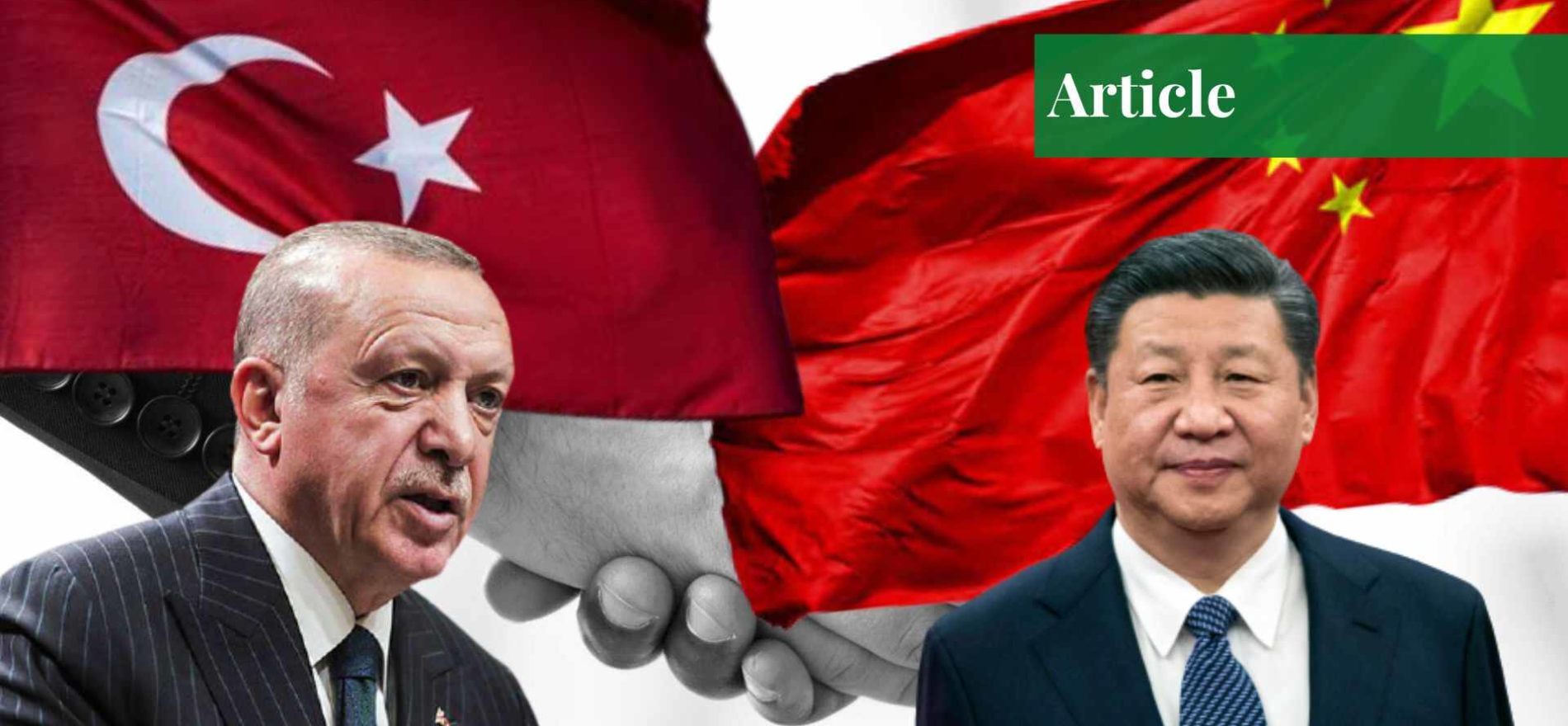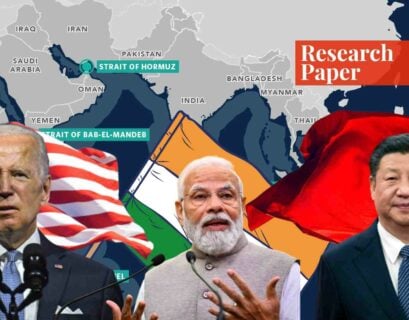Ms. Samana Mehmood is currently pursuing her bachelor's in international relations from Quaid-i-Azam University, Islamabad. Her areas of interest include non-traditional security challenges, geopolitics, international law, Middle Eastern politics, and South Asia.
Introduction
In 1971, Ankara and Beijing formally established diplomatic ties. Since then, the relations between these countries have progressively improved. Despite having differing ideologies, both nations prioritize their shared interests. China and Turkey are more than 6,000 kilometers apart but common geostrategic and economic interest has abridged this gap. In recent years, Turkey-China relations have been advancing rapidly. The Turkish-Chinese relationship isn’t limited to these two countries but has gained a global dimension.
China, the second-largest economy in the world and a power that may aid Turkey in closing its economic and technological disparities, is seen by Ankara as a critical actor in the international system. China’s development of close ties with Turkey is important. Geographically, Turkey sits at the intersection of Asia, Africa and Europe. It has a significant impact on the geopolitics of West Asia, the Balkans, and North Africa. Therefore, in order to implement its Eurasian ambitions, China needs the backing of regional countries like Turkey.
Sino-Turkish Bilateral Relations
Sino-Turkish relations have just entered an era of development based on mutual advantages. Trade has grown and the pace of intergovernmental communication has accelerated.
Economic Cooperation
The most active area of Turkey-China collaboration is economic relations. Since 2010, Turkey and China have finalized numerous agreements and cooperation projects totaling a sizable amount of work. Obstacles still exist for both nations, including the Uyghur issue. However, China has recently emerged as one of Turkey’s most significant and captivating trading partners.
Economic ties have accelerated between both countries in recent years. The trade volume between the two countries was around USD 32 billion in 2021. On the other hand, Turkish exports to China amounted to USD 3.66 billion. China has mostly benefitted from these flourishing trade links. This has led to a significant trade deficit, which Turkey is working to rectify.
The Belt and Road Initiative (BRI) and Turkey’s Middle Corridor setting of the Silk Road collaboration places a strong emphasis on the future. The “Modern Silk Road” initiative is also crucial for Turkey-China trade, the Caucasus, and Central Asian nations. Ankara put out a proposal in 2015 to serve as the “Middle Corridor” entry point in BRI. The Belt and Road Initiative (BRI) of China, which aims to better connect China with Eurasian and Middle Eastern nations, is the umbrella organization for the CPEC project.
Turkey-China relations show a rollercoaster pattern at times. Although both nations held opposing views on a number of subjects, such as UN reform, the Syrian crisis, the Arab Spring, and the Nagorno-Karabakh conflict, their shared interests brought them together. Chinese companies are involved in a significant number of transportation infrastructure projects in Turkey, despite the fact that the two nations have divergent perspectives on the fight against terrorism. Joint military technology and exercises can be seen as the beginning of long-term cooperation between China and Turkey.
Cultural Relations
From a cultural perspective, Turkey-China relations show how Muslim and Confucian identities interact. The Republic of Turkey has a secular constitution and a majority-Muslim population. On the other hand, China is a representation of Confucian culture, which was founded on prehistoric religious principles and established the social norms and higher aspirations of the traditional Chinese society.
In order to promote Chinese culture around the world, China established the Confucius Institute in 2004. It has four Confucius institutes in Turkey. Also, Turkey opened the Yunus Emre Institute in Beijing to promote Turkish culture. Additionally, Turkey sponsored the “Year of Tourism” in China in 2018, which increased the number of Chinese tourists there.
Defense Cooperation
In a complex international setting where both nations share a sense of being rejected and sidelined by the West, defense cooperation can be seen as an emerging characteristic of Turkey-China relations. Even though the two countries have different perspectives on the fight against terrorism, joint military exercises can be seen as the beginning of long-term cooperation.
In the defense industry, Turkey and China took their first significant step forward in 1996. China and Turkey inked a contract for the purchase of 150 million dollar medium-range WS-1 missiles and collaborative manufacturing in Turkey. In 2002, technology transfer policies and joint production was increased. Turkey demanded cooperation with China in 2005 for space technology and medium-range air defense systems.
A 2009 deal between China and Turkey led to an expansion of their defense cooperation and joint military exercises. China and Turkey upgraded their relationship to a “strategic partnership” in 2010, joining forces in industry, politics, and security. Since then, commerce has grown tremendously, and there have been many high-profile infrastructure projects. A new MoU for the Trans-Caspian International Transit Route for containerized rail transport was signed by the two nations in 2016. The Turkish Long Range Air and Missile Defense System marked a milestone in military cooperation.
Problematic Issues
Few issues still exist in Sino-Turkish bilateral ties. Among them, the Uyghur issue is the most prominent one.
Uyghur issue
The issue of Uyghur Muslims in China continues to be the most important one in relations between China and Turkey. It has triggered political tensions between the two countries many times. In the northwest region of China, majority of the Muslims are Uyghurs. Turkey has expressed strong disapproval of China’s treatment of Uyghurs. Due to the Uyghur issue, China has not been able to properly build a link with Turkey.
The handling of Uyghur tensions by the two governments through dialogue and understanding has advanced recently, but it continues to be a problem that undermines confidence and trust between Ankara and Beijing. The presidents of both nations decided in July 2015 that Ankara would not permit anyone to exploit Turkish territory to undermine China’s security or national interests.
The Turkish government has handled the Uyghur issue better ever since the late 1990s. It still has the potential to harm ties between Turkey and China, particularly during the Xinjiang crisis.
Conclusion
Erdogan’s diplomacy must strike a balance between the complex Uyghur issue and Beijing’s need to save its economy, connections with Muslim nations, and relations with the West when it comes to relations with Beijing. For President Erdogan’s administration to survive in the face of a faltering economy, Chinese investments in Turkish infrastructure are essential.
The two emerging powers of the international system, China and Turkey, will play a more significant role in global affairs in the 21st century. Both parties are committed to getting over their differences and maintaining a solid partnership. Despite a number of issues, there are several opportunities.
Turkey is an important component of the BRI Middle Corridor, which is expected to see investments in the range of USD 40 billion. Turkey views China as the world’s next great power. In a similar vein, China views Turkey as a partner in significant infrastructure projects, a developing market for its exports, and an essential link in BRI.
Chinese influence in Asia is increased by military and economic collaboration with Turkey, which also serves as a gateway to Europe. The bilateral relationship still largely depends on the economy. In the areas of transportation, energy, and telecommunications, as well as a potential nuclear plant project in the northwest of Istanbul, Chinese investor-collaboration is evident.
If you want to submit your articles and/or research papers, please check the Submissions page.
The views and opinions expressed in this article/paper are the author’s own and do not necessarily reflect the editorial position of Paradigm Shift.



















